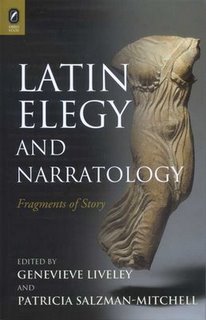
Genevieve Liveley, Patricia Salzman-Mitchell (dir.), Latin Elegy and Narratology. Fragments of Story
Ohio, Ohio State University Press, 2008, 328 p.
- Isbn: 9780814204061
- $69.95
Recension par John Henderson (King's College, Cambridge) dans Bryn Mawr Classical Review 2009.09.24.
Inrecent decades, literary studies have shown great interest in issuesconcerning the elements of narrative. Narratology, with its most vocalexponents in the writings of Bal, Genette, and Ricoeur, has alsoemerged as an increasingly important aspect of classical scholarship.However, studies have tended to focus on genres that are deemedstraightforwardly narrative in form, such as epic, history, and thenovel. This volume of heretofore unpublished essays explores howtheories of narrative can promote further understandings and innovativereadings of a genre that is not traditionally seen as narrative: Romanelegy. While elegy does not tell a continuous story, it does containmany embedded tales—narratives in their own right—located within andinteracting with the primarily nonnarrative structure of the externalframe-text.
Latin Elegy and Narratology is thefirst volume entirely dedicated to the analysis of Latin elegy throughthe prism of theories of narrative. It brings together an internationalrange of classicists whose specialties include Roman elegy, Augustanliterature more generally, and critical theory. Among the questionsexplored in this volume are: Can the inset narratives of elegy, withtheir distinctive narrative strategies, provide the key to a poetics ofelegiac story telling? In what ways does elegy renegotiate thelinearity and teleology of narrative? Can formal theories ofnarratology help to make sense of the temporal contradictions andnarrative incongruities that so often characterize elegiac stories?What can the reception of Roman elegy tell us about narratives ofunity, identity, and authority? The essays contained in this volumeprovide provocative new readings and an enhanced understanding of Romanelegy using the tools of narratology.